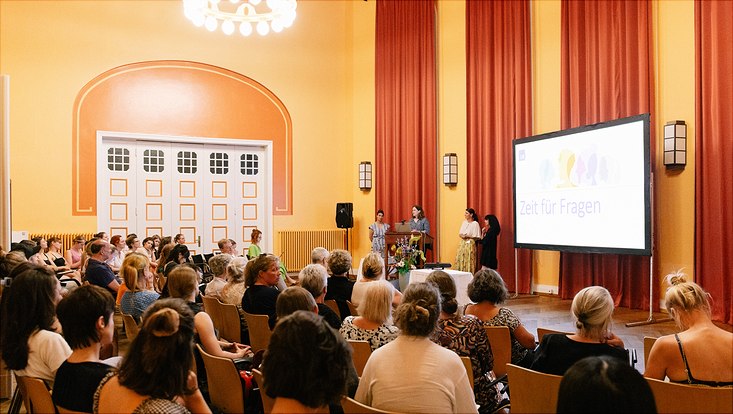Research communication fundingExciting dialog with target groups outside of academiaAnja Lindig on her final symposium on the CarePreg study
3 December 2024

Photo: HRA/Schwenzer
Dr. Anja Lindig and Dr. Jördis Zill organized a hybrid symposium with the help of the HRA Fund for Science Communication, in which they presented and discussed data from the CarePreg study on the care situation for unintended pregnancy and the desire for an abortion in Germany.
How did you come up with the idea for this project?
The CarePreg study, funded by the Federal Ministry of Health, was carried out at the UKE in Hamburg from 2020 to 2024 and was able to provide numerous important new findings on the topic of abortion in Germany. This has been a politically and socially highly relevant, much-discussed and often emotionally charged topic for many years. Until now, there was hardly any high-quality data on the care situation and the experiences of those affected in Germany.
As project leaders, it was important to us not only to publish our research findings in international scientific journals, but also to make them accessible to all interested parties from the care sector and beyond. Our aim was therefore to plan an event at which we could present our results in a generally understandable way, but also provide low-threshold information about the abortion care situation and create space for exchange.
Which target group(s) did you want to address with the symposium, how did you reach them and who took part in the end?
Our symposium was aimed at everyone, including counselors from pregnancy conflict counseling centers, doctors from practices and clinics, those affected and other interested parties. We chose a hybrid format so that interested parties from outside Hamburg could also take part. Around 50 people took part on site in the beautiful premises of the Erika-Haus at the UKE. During the Q&A sessions in plenary, during the breaks and at the subsequent get-together, there were many exciting discussions and exchanges between the participants. In addition, around 60 people took part via Zoom and were also able to contribute with questions and comments.
How did the funding help?
Without the research communication funding, we would not have had the financial means to realize the symposium. No money was earmarked for a final symposium as part of the study and science communication projects are not (yet) funded as standard. We were only able to realize our idea thanks to the uncomplicated funding and the support of the Institute and Polyclinic for Medical Psychology.
What would you recommend to other researchers who – like you with your symposium – want to enter into a dialog with target groups outside of academia?
The dialog with target groups outside of academia is always exciting and contributes to a greater gain in knowledge – the views of people who come directly from the healthcare sector were extremely relevant to our research question and enriched the research process. Making research results accessible to the general population should be an integral part of research projects. It is tragic when great research projects and important findings disappear into a drawer or are only made accessible to a small and specialized group of researchers. Especially when it comes to politically and socially relevant issues such as ours, we must try to present our research findings in a way that is generally understandable in order to provide food for thought and impart sound knowledge.
However, it cannot be concealed that research communication is sometimes unfamiliar and costly, takes time and resources and is usually an “add on” alongside normal research work, i.e. it is not usually financed as part of third-party funded projects. The motivation and idealism of researchers is therefore a key factor here. These difficult conditions should change in the future. Nevertheless, it is definitely worth it!
Research communication funding
You have a good idea, but do not have the funds you need to implement it? The Hamburg Research Academy, in conjunction with the Claussen-Simon Foundation, provides funding to early career researchers for projects in the area of research communication. You can apply for funding for you own projects from the Hamburg Research Academy fund.



